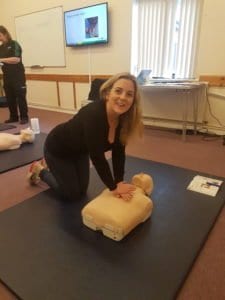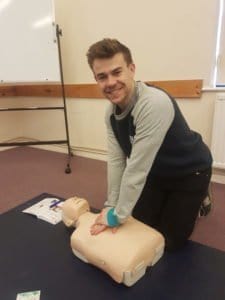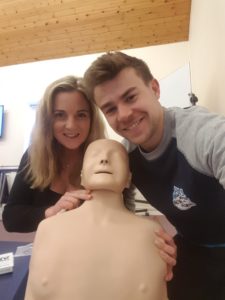Our Event Sales Manager Adam Gilbert and Event Executive Charlie Martin successfully passed their Emergency First Aid at Work qualification. Read below to hear Charlie Martin explain the importance of Emergency First Aid at Work.
Emergency First Aid at Work
Having had our busiest Summer ever in 2017, Site Equip is growing and to account for this, our dynamic team is increasing. There are new faces in the office and more delivery and service drivers ready to continue offering new and existing customers a great service throughout 2018. Thus, we have two newly qualified first aiders on board ready to help in the office, workshop and yard in the unlikely circumstance that it’s needed.
Myself and our Event Sales Manager, Adam Gilbert, undertook the three day ‘Emergency First Aid at Work’ course taught by the brilliant St John Ambulance organisation.
The course was thorough, well organised and involved learning about when to call for further medical help, using accident report forms and what to do in the event of any of the following incidents:
- Burns
- Minor bleeds
- Major bleeds
- Head injuries
- Convulsive seizures
- Spinal injuries
- Allergic reactions
- Asthma attacks
- Low blood pressure
- Stokes
- Heart attacks
- Choking
- Fractures
- Poisoning
It was educational and in our opinion extremely worthwhile, it’s surprising how many common myths were dissipated, such as how you shouldn’t put something in a seizure patient’s mouth to bite. While somebody suffering a seizure may very well bite his or her tongue, it rarely becomes an airway emergency and a bitten tongue/lip is, at this point, not the priority!
Adam and I now feel confident in performing life saving treatment whilst waiting for medical professionals to take over and we are confident in deciding when it is or is not necessary to call an ambulance.
There were many acronyms we learnt, some of which most of us already knew such as the FAST test in potential stroke patients (Face, Arms, Speech, Time) but others which were new to us.
The initial assessment to remember in any minor situation or medical emergency is the primary survey – DRABC – which you can easily and aptly remember as Dr. Abc!
Danger – if someone needs help, make sure the area is safe before approaching.
Response – do they respond when you ask a simple question/command?
Airway – check if their airway is open and clear.
Breathing – look and listen to check they are breathing and take appropriate action if not.
Circulation – check if they are bleeding and take appropriate action. Move on to the secondary survey if possible.
The secondary survey involves using the SAMPLE acronym to further assess the seriousness/nature of the incident;
Signs, Allergies, Medication, Past history, Last food and drink, Events (leading up to incident/illness/injury).
We realise the importance of keeping these skills up to date and will participate in the refresher training when due. If your team are considering doing this course, we highly recommend it, as do our colleagues who are safe in the knowledge that they can be helped at work if necessary.
If you would like to get in touch with our friendly sales team, please do not hesitate to give us a call on 0800 371 994 or email us at the address at the top of the page.



Leave a Reply